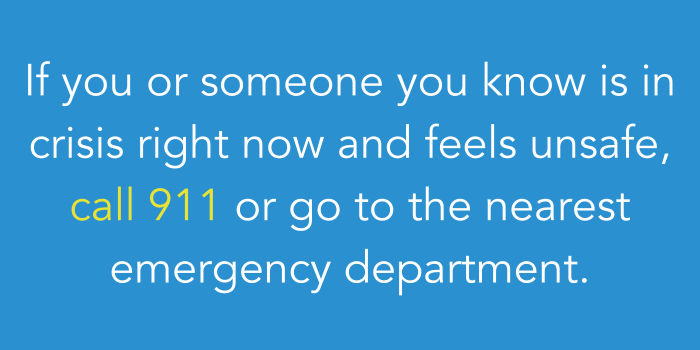Mental Health Resources

Need to connect to a Crisis Responder?
9-8-8 is a suicide crisis hotline with round-the-clock crisis responders available.
If you are thinking about suicide, or you’re worried about someone else, call or text 9-8-8 toll free, 24/7, 365 days/year.
Hope for Wellness offers mental health counselling and immediate crisis intervention for all Indigenous people across Canada by phone or online chat. Services offered in English, French, Ojibwe, Cree and Inuktitut.
- Call Toll Free 24/7, 365 days/year: 1-855-242-3310
Kids Help Phone offers free, confidential crisis services for young people (ages 5-25)
- Call Toll Free 24/7 365 days/year: 1-800-668-6868
- Text CONNECT 24/7: 686868

Other mental health and wellness resources available to all midwives
AOM On Call
AOM On Call (login required) is a confidential resource for midwives. Non-urgent concerns are answered during business hours; however, the AOM On Call team is also available 24/7 for urgent risk management concerns.
Other supportive resources you can find on the AOM website include:
Self-referral psychotherapy for frontline clinicians
The Ministry of Health and Ontario Health have partnered to help health-care workers achieve health and wellness while coping with a wide array of stressors including the pandemic, or other crises. All health-care workers in Ontario who require mental health and/or addictions support are eligible.
You can receive services through the following centres by submitting this self-referral form:
- CAMH
- Ontario Shores Centre for Mental Sciences, Whitby
- St. Joseph's Healthcare, Hamilton
- The Royal Ottawa Mental Health Centre, Ottawa
- Waypoint Centre for Mental Health Care, Penetanguishene
Additional resources
BounceBack gives you access to materials and resources that can be customized to fit your needs. You will have access to workbooks, activities, videos and a trained coach who can provide up to six telephone sessions.
BreakingFree is a free online, evidence-based, self-guided well-being and recovery support program available 24/7.
Phone: 1-833-325-1338
Affordable Therapy Network: is a “directory of Independent Therapists and other Mental Health Professionals offering Low Cost and Sliding Scale rates across Canada” with the goal of making mental health support accessible and affordable for everyone.
Indigenous-specific resources
Culturally safe and wholistic approaches to care are important components of services being offered to the Indigenous population. It is important that Indigenous communities have easy and fast access to trustworthy, factual and effective resources to support their mental wellness.
Hope for Wellness offers mental health counselling and immediate crisis intervention for all Indigenous people across Canada by phone or online chat. Services offered in English, French, Ojibwe, Cree and Inuktitut.
Talk4Healing provides helpline support and resources for Indigenous women, by Indigenous women across Ontario, in 14 languages.
NIHB Mental Health Services (see eligibility criteria) provides 22 hours of counselling per year offered by Psychologists, Social Workers, Psychiatric nurses or other regulated mental health providers covered under the Non-Insured Health Benefits for First Nations and Inuit (NIHB). Contact your regional office for more information.
IBPOC-specific resources
Affordable Therapy Network: Find a therapist in your province with a specific community focus such as IBPOC, LGBTQ+, religious belief, disability and other intersecting identities.
Gray Matter Health: Mental health studio designed to support individuals, couples, families and organizations with culturally sensitive mental wellness services.
Healing from the effects of Internalized Oppression: Information on understanding culture and diversity, how to strengthen multicultural collaboration, spirituality and community building.
Healing in Colour: Canada-wide database of therapists for IBPOC individuals.
Hello Leena: Canada's first and largest IBPOC-focused mental health platform with financing options available.
Hong Fook Mental Health Association: A leading ethno-cultural community mental health agency with a consolidated culturally competent team serving Asian and other communities in the Greater Toronto Area.
Hope for Wellness offers mental health counselling and immediate crisis intervention for all Indigenous People across Canada by phone or online chat. Services offered in English, French, Ojibwe, Cree and Inuktitut. Call Toll Free 24/7, 365 days/year: 1-855-242-3310
Liberate: Free meditation app designed specifically for the IBPOC community and led by IBPOC teachers.
South Asian Therapy Directory: The largest South Asian mental health community in the world serving South Asian diaspora.
Stressors impacting midwives' mental health
Midwifery is impactful and rewarding work that comes with a great sense of personal value and joy. There are also times when aspects of the work can challenge midwives’ mental and emotional capacity considering factors such as:
- Repercussions of the COVID-19 pandemic and the ensuing health human resources crisis:
The Healthy Professional Worker Partnership (PDF, 2 MB) compared professional workers’ (in the fields of medicine, dentistry, midwifery, nursing, teaching, academia and accounting) experiences of mental health, stress and burnout pre- and post-pandemic and found: "Mental health declined and distress, presenteeism and burnout increased significantly during the COVID-19 pandemic for all professional workers studied; Mental health during the pandemic was notably low for workers in Midwifery, Nursing and Teaching professions." - Racism, discrimination and oppression (login required), including systemic and institutional, inter- and intra-professional, from clients and/or their relatives, and from the community:
Midwives who are members of equity-deserving groups face additional risks to their mental health and well-being through experiences of overt discrimination and systemic oppression. - Workplace violence and harassment from clients and/or their relatives, colleagues, hospital administration.
- Working with disability.
- Secondary trauma (PDF, 445 KB)
- Moral distress and moral injury:
Moral Distress can arise when a midwife feels that they know what they need to do (usually to care for a client or their community) but are prevented from doing so by other factors, such as lack of resources.
Moral injury can occur when a midwife’s deeply held beliefs and trust are threatened. - Injury to dignity:
Midwives can experience injury to dignity in their work through both overt and systemic devaluing of their professional worth by the government, the health care system, other healthcare professionals, institutional policies and procedures, clients, and the general public. - Hospital integration challenges:
Sometimes hospital integration challenges can interfere with midwives’ sense of job satisfaction and joy in the work.
